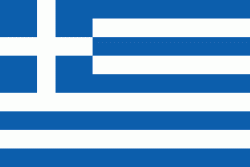Pieria (Nomós Pierías)
The Pieria regional unit is bordered by Imathia to the north, Kozani to the west, and to the south and west by the region of Thessaly's regional unit Larissa. The Pierian Mountains lie to the west; the Thermaic Gulf lies to the east. It also has a valley by the GR-13. Most of the population live within the Olympian Riviera. The lowest point is the Thermiac Gulf and the highest point is Mount Olympus.
It combines extensive plains, high mountains and sandy beaches. The region's beauty gives it a great potential for further tourist development.
Map - Pieria (Nomós Pierías)
Map
Country - Greece
 |
 |
| Flag of Greece | |
Greece is considered the cradle of Western civilization, being the birthplace of democracy, Western philosophy, Western literature, historiography, political science, major scientific and mathematical principles, theatre and the Olympic Games. From the eighth century BC, the Greeks were organised into various independent city-states, known as poleis (singular polis), which spanned the Mediterranean and the Black Sea. Philip II of Macedon united most of present-day Greece in the fourth century BC, with his son Alexander the Great rapidly conquering much of the ancient world, from the eastern Mediterranean to the North Western parts of India. The subsequent Hellenistic period saw the height of Greek culture and influence in antiquity. Greece was annexed by Rome in the second century BC, becoming an integral part of the Roman Empire and its continuation, the Byzantine Empire, which was culturally and linguistically predominantly Greek.
Currency / Language
| ISO | Currency | Symbol | Significant figures |
|---|---|---|---|
| EUR | Euro | € | 2 |
| ISO | Language |
|---|---|
| EN | English language |
| FR | French language |
| EL | Greek language |















